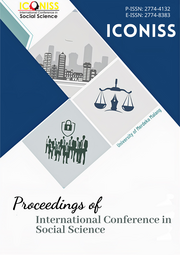Analysis of the Basis of the Decisions of the Judges in the Criminal Proceedings of Corruption at Perusda Aneka Services (AUJ) Bontang
DOI:
https://doi.org/10.26905/iconiss.v3i1.9091Keywords:
Judicial considerations, crimes of corruptionAbstract
A criminal offense or punishable act is a breach of norms committed by an actor, intentionally or unintentionally, with the conviction of the perpetrator aimed at maintaining the rule of law and safeguarding the public interest. The constituent elements include conduct and consequences, circumstances accompanying or accompanying the act, additional circumstances aggravating the offense, objective unlawful elements, and subjective unlawful elements. As in decision No. 11/Pid.Sus.Tpk/2020/Pn Smr, where the jury did not consider all the aspects that should be included in the basis for considering the decision, which is in the element of receiving and in the element of gratuity is understood as actual acceptance, actual transfer of control over the item, direct or indirect receipt of the goods/items/gifts or if the item was not accepted, confirmation of acceptance by the recipient. The reward element refers to the explanation of Article 12b of the Anti-Corruption Act. In the case of satisfaction and justice in the case Decision No. 11/Pid.sus.TPK/2020/PN Smr, Referring to the decision of the judge in the corruption case Dandi Prio Anggono, S.Sos as director of the Regional Enterprises and Services Company whose where the jury did not consider all the aspects that should be included in the basis for considering the decision, decision that found the accused guilty. In the decision of the defendant Dandi Prio Anggono, S. Sos, the judge's panel ordered the defendant to pay compensation of Rp. because the defendant had finally proved and collectively committed a criminal act of corruption and knowingly passed on funds to several people including the DPRD, but in the claims for compensation demanded money, and persons who received the flow of money non-prosecuted evidence in the dictum of the prosecutor's statements of the indictment, therefore the decision was based on the principle of evidence with tools and evidence and the witness, in accepting the decision, the judiciary issued a decision finding the accused guilty.Downloads
References
Achmad, A. 2009). Menguak Teori Hukum (Legal Theory) Dan Teori Peradilan (Judicialprudence) Termasuk Intepretasi Undang-Undang (Legisprudence). Jakarta: Kencana Prenada Media Group.
Achmad, A. (2011). Menguak Tabir Hukum. Bogor: Ghalia Indonesia.
Ali, M. (2014). Hubungan Antara Sumber dan Metode Penghitungan Kerugian Keuangan Negara dengan Penetapan Uang Pengganti. Jurnal Hukum IUS QUIA IUSTUM, 21(1), 43-60.
Damask. (2016). Perkembangan Hukum Pidana Kontemporer. Jakarta: Rajawali Press.
Danil, E. (2021). Korupsi: Konsep, Tindak Pidana dan Pemberantasannya. Rajawali Pers. PT. RajaGrafindo Persada.
Hadjon, P. M. (2017). Perlindungan Hukum Bagi Rakyat Indonesia. Surabaya: Bina Ilmu.
Ismail, N. H. (2016). Perkembangan Hukum Pertanahan Indonesia: Suatu Pendekatan Ekonomi Politik. Fakultas Hukum Universitas Gajah Mada, Yogjakarta.
Mertokususmo, S. (2019). Mengenal Hukum Suatu Pengantar. Cetakan 13 (Yogyakarta: Liberty).
Moeljatno. (1993). Asas-asas Hukum Pidana. Jakarta: Rineka Cipta.
Mulyati, N. (2018). Pertanggungjawaban Pidana Korporasi. Depok: PT. Raja Grafindo Persada.
Reksodiputro, M. (2012). Kriminologi dan System Peradilan Pidana. Jakarta: PPK).
Sunggono, B. (2018). Metodologi Penelitian Hukum. Jakarta: Rajawali Pers.
Suhariyanto, B. (2017). Pertanggungjawaban Pidana Korporasi Berdasarkan Corporate Culture Model dan Implikasinya Bagi Kesejahteraan Masyarakat. Jurnal Rechts Vinding: Media Pembinaan Hukum Nasional, 6(3), 441-458.
Tuanakotta, T. M. (2009). Menghitung kerugian keuangan negara dalam tindak pidana korupsi. Jakarta: Penerbit Salemba.
Waluyo, B. (2018). Penelitian Hukum Dalam Praktik. Cetakan Keempat. Jakarta: Sinar Grafika.
Yunara, E. (2005). Korupsi dan pertanggungjawaban pidana korporasi: berikut studi kasus. Citra Aditya Bakti.
Downloads
Published
Issue
Section
License
Authors who publish in this journal agree to the following terms:
(1)Â Copyright of the published articles will be transferred to the journal as the publisher of the manuscripts. Therefore, the author confirms that the copyright has been managed by the journal.
(2) Publisher of Proceedings of International Conference in Social Science is the University of Merdeka Malang.
(3) The copyright follows Creative Commons Attribution–ShareAlike License (CC BY SA): This license allows to Share — copy and redistribute the material in any medium or format, Adapt — remix, transform, and build upon the material, for any purpose, even commercially.

